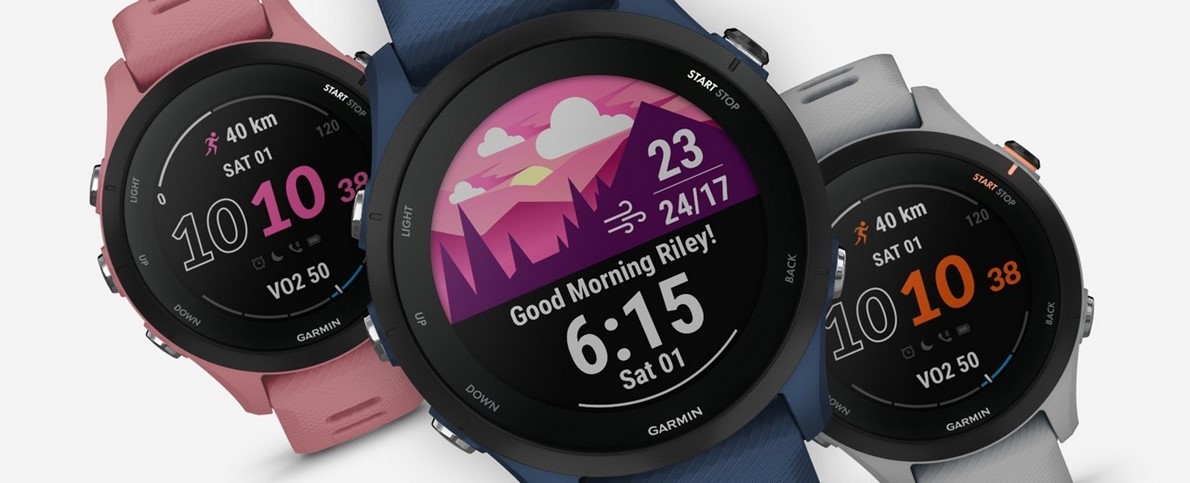A part from a few
minor changes, the
Garmin Forerunner 255S lineup is nearly identical to its
predecessor. The most noticeable difference with the Forerunner 255S is that
Garmin now offers four versions of the watch rather than two. The focus is not
so much on big updates but rather on a slew of small ones that improve on the
core experience with the Forerunner 255S series.
اضافة اعلان
To help highlight
the changes, we took a look at the 255S. The watch has a 41mm case and weighs
39 grams. If you have a larger wrist, a 46mm version that weighs 49 grams is
also available. It is comparable to an Apple Watch and is significantly lighter
than flagship
GPS watches like the Polar Grit X Pro (79g) or the Coros Vertix 2
(89g).
While the watches
are not the most fashionable wearables on the market, they are also not a
fashion faux pas. And if you choose a more subdued color, the watch can easily
transition from a day-outfit staple to a night one.
The Forerunner 255S
also has a more accurate heart rate sensor, a barometric altimeter, a compass,
multiband GPS, and an NFC chip for contactless payments.
The battery life
has also been improved slightly to an estimated 12 days on a single charge. In
25 days of use, with roughly 30 minutes of GPS activity per day, users only had
to charge the Forerunner 255S once.
It also helps that
the 255S employs a memory-in-pixel display rather than a power-hungry OLED for
better visibility in direct sunlight. A wise choice, as the watch targets
outdoor runners that clearly prioritize battery life over fancier features like
a vibrant touchscreen.
However, the most
significant update is the multiband GPS.
While the watches are not the most fashionable wearables on the market, they are also not a fashion faux pas.
In a nutshell,
multiband GPS (also known as dual-frequency GPS) enables a watch to connect to
multiple major satellite systems simultaneously. The advantage is that you will
have greater accuracy in difficult environments. And finding a multiband GPS at
this price is insane.
Not only are
multiband GPS’ a relatively new feature in the space of wearables, but they are
also typically found on high-end fitness watches.
Heart rate tracking
on the 255S is comparable to that on the Series 7 and the Polar H10 chest
strap, which averages 3–5 beats per minute. Sleep tracking is mostly
sufficient, though it was not as sensitive in tracking all the times we found
ourselves waking during the night.
So, if you are
looking for accurate sleep tracking, Garmin’s offering should probably not be
your go-to. That is because, at its core, the Forerunner 255S is not a health
wearable like the
Oura Ring or
Apple Watch. It is meant for training, and it is
best suited to runners.
The 255S comes with
two new racing widgets and Garmin’s Morning report feature. The Racing Calendar
widget displays a list of your upcoming events, your estimated finish time, and
the weather forecast for race day.
Meanwhile, the Race
widget generates daily workout recommendations based on your personal training
requirements. The Morning Report appears on the watch first thing in the
morning and provides a summary of your sleep, weather, and some of your
recovery metrics.

Overall, these are
useful tools for runners, but triathletes can also benefit now that Garmin has
added the triathlete activity to the Forerunner 255S lineup. So, you can switch
between running, swimming, and cycling in a single workout.
But this is no easy
feat, especially considering Garmin remained with their standard five-button
menu navigation, which can be a difficult interface. Garmin veterans are
probably used to the routine, but for newcomers, it surely can be intimidating,
especially if you are coming from another platform or touchscreen watch.
However, with the
less-than-intuitive interface and accuracy errors on the side, the 255S is
ideal for runners’ requirements and would be useful for training insights and
metrics.
The only thing
users may have wished for the 255S to feature is the Fenix 7 series’ real-time
stamina monitoring. Having said that, we would not recommend paying twice the
price just to get it.
To summarize, we
strongly recommend this to anyone looking for a comfortable, no-frills,
long-lasting GPS watch that will not break the bank.
It costs around
JD250, about JD30 more than its predecessor, but you have to consider that you
are getting multiband GPS at a discount.
... If you are looking for accurate sleep tracking, Garmin’s offering should probably not be your go-to.
While this watch is geared toward runners, the addition of
triathlete support makes it a compelling option for those looking for a
multisport watch on a budget. The Forerunner 255S is not the most flashy Garmin
device, but it’s the one that gives you the most bang for your buck.
Read more Technology
Jordan News




